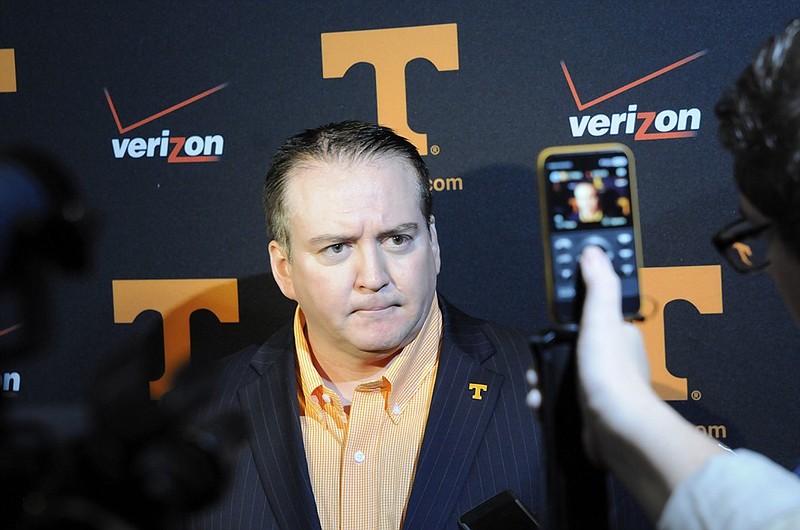KNOXVILLE - Committing three of the NCAA's cardinal sins saddled former Tennessee men's basketball coach Donnie Tyndall with historic punishment from the governing body.
For arranging widespread academic fraud, extending impermissible benefits to players and making multiple attempts to influence the ensuing investigation during and after his two-year tenure at Southern Mississippi, Tyndall was slapped with a 10-year show-cause penalty by the NCAA on Friday.
It's essentially a college coaching death sentence for Tyndall, who would be barred from "all coaching duties," according to the NCAA, if hired by a member school between now and April 7, 2026. He would be suspended for half of his first season if hired after that date.
Tyndall's punishment, though severe, is not unprecedented. In 2005, former Baylor men's basketball coach Dave Bliss received a decade-long show-cause for telling his team to lie about circumstances regarding the murder of one of his players, among other transgressions. Bliss recently completed his first season as coach at NAIA program Southwestern Christian, his first college coaching job since Baylor.
In 2011 the NCAA slapped former Tennessee men's basketball coach Bruce Pearl with a three-year show-cause and his assistants with one-year penalties for lying to investigators and attempting to influence others involved in the case to lie. Pearl has been head coach at Auburn the past two seasons.
On Friday the NCAA said Tyndall "acted unethically and failed to promote an atmosphere for compliance when he directed his staff to engage in academic misconduct fabricated a document to justify payments to student-athletes and took other actions to thwart the investigation."
Tyndall, who was 16-16 in his lone season with the Volunteers in 2014-15 - he was hired after back-to-back NIT appearances at Southern Miss - told CBS Sports he plans to appeal.
"There are 4,000 pages of transcripts and documentation, 40 people were interviewed, and not one bit of evidence directly links me to the violations, and not one person involved linked me to the violations except Adam Howard (his former assistant coach at Southern Miss and Tennessee)," Tyndall told Gary Parrish on Friday afternoon.
"And Adam Howard said this after he initially lied. And then he lied again. And then we had to fire him at Tennessee. And then he cut a deal in March for full immunity if he would talk on me. So then he talked on me."
Howard and R.J. Rush, Tyndall's graduate assistant at Southern Miss, abruptly resigned from their positions with Tennessee in November 2014. The NCAA investigation began the previous summer.
Six weeks after Southern Miss hired him, Tyndall began arranging for an assistant coach and two graduate assistants to complete online coursework - in some cases that involved them traveling to do so - for junior-college players. Members of Tyndall's staff also paid for the registration fees for prospects' online courses. In its report, the NCAA cited computer metadata revealing one player's online assignments were submitted from the graduate assistant's hometown in Pennsylvania, while other work was submitted from Hattiesburg, where Southern Miss is located.
Tyndall also arranged cash and prepaid credit cards - meant for expenses such as tuition, room and board - for two players through one's high school coach and the other's prep school coach, both of whom received their own show-cause penalties.
In his interviews with the NCAA, Tyndall claimed he had the first set of payments approved by the Southern Miss compliance director, who told investigators he did not recall that conversation.
On Oct. 31, 2014, three days before his exhibition opener at Tennessee, Tyndall had his director of basketball operations fabricate a document containing notes and the university's of approval of those payments from an alleged meeting with the compliance director in June 2012.
Tyndall also used a cellphone registered in his mother's name to contact individuals involved in the investigation and did not divulge he did so until his third interview with NCAA investigators. During a 10-day period in fall 2014, Tyndall made a combined 163 calls and sent 57 total text messages to the high school coach, the prep school coach and his assistant coach.
"The times, pattern and frequency of the phone/text contacts and attempted contacts show," the NCAA's report states, "that the former head coach was anxious almost to the point of frantic to contact various individuals and determine or influence what information they were providing to the NCAA."
Tyndall also deleted emails relevant to the investigation from an account he maintained at Morehead State - his alma mater and a previous coaching stop that was put on probation for recruiting violations during his time there - and admitted doing so to the NCAA on March 16, 2015, 11 days before Tennessee fired him.
Contact Patrick Brown at pbrown@timesfreepress.com.
